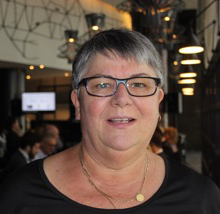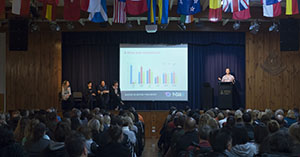Parents must learn the language and culture of young people online before having meaningful conversations with their children about it.
So says clinical psychologist Dr Michael Carr-Gregg, who told Firbank Grammar’s Social Media 101 information night that parents must help teenagers with immature brains navigate social media.
Dr Carr-Gregg talks about the impact of social media on teenage girls
Dr Carr-Gregg said a technology-free dinner time was the perfect way to talk and bond. Research showed that children who had this were more likely to do better at school and resist illicit drugs.
“The research is crystal clear and yet we have a decline in the number of families who are actually managing to do this,” he says.
While there was no firm evidence that their time online was affecting kids’ language skills or turning them into “sociopathic monsters”, Dr Carr-Gregg said it was important for parents to regulate use.
“Setting limits and boundaries is a beautiful thing,” he said. “Please, stick to the age restrictions for each individual platform of social media. They’re there for a reason and the age limits are sensible.’
“As a parent or guardian, if you think that your child’s behaviour online is having a negative impact on other aspects of their life, it’s too much time and you have to step in.
“Make sure that you’re setting those limits and boundaries and negotiate consequences.”
Another rule of thumb is to never post anything online that you wouldn’t want your parents, the police, a principal or predator to see.
“Young people are all online,” Dr Carr-Gregg says. “They need to learn the skills, the knowledge and the strategies to use the Internet in a safe, smart and responsible way.
“Please let it not be the case that we have to talk to you after a sudden disaster. Be proactive, have these conversations now.”
Dr Michael Carr-Gregg is one of Australia’s highest profile psychologists, author of 10 books, broadcaster and a specialist in parenting, children, adolescents and the use of technology for mental health.



